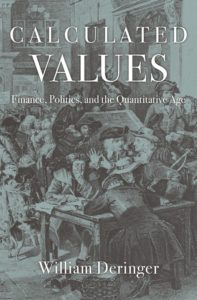William Deringer is an Associate Professor of Science, Technology, and Society. His research examines the history of those techniques and technologies of calculation that organize modern economic, financial, and political life. His work ranges widely across time, from early compound-interest tables and changing social relations in the English countryside in the early 1600s, to the place of computer spreadsheets in the culture of Wall Street in the “go-go” 1980s.
Deringer’s first book, Calculated Values: Finance, Politics, and the Quantitative Age (Harvard University Press, 2018), is a history of how numerical calculations became an authoritative mode of public reasoning. Focusing on Great Britain, Calculated Values argues that a pervasive, public reverence for “facts and figures” first emerged in the half-century following the Revolution of 1688, through political debates about public finance. Examining the numerical controversies that frequently arose in British politics, including during prominent events like the Union of England and Scotland in 1707 and the 1720 South Sea Bubble, Calculated Values offers a new explanation for how numbers became so esteemed in public life: their use in antagonistic argumentation. While in the 21st century, we are likely to assume that numbers get deployed in political arguments because numbers are seen to be an especially “objective” form of knowledge, in the 18th century this process worked in the other direction. Eighteenth-century Britons came to believe that numbers were a special form of knowledge because of how they were deployed in political arguments. Paradoxically, a common belief in the honesty and disinterestedness of numbers grew out of a political culture in which partisan calculators used numbers to do cynical and highly interested things. Calculated Values was awarded the 2019 Oscar Kenshur Prize by the Center for Eighteenth-Century Studies at Indiana University, and the 2021 Joseph J. Spengler Prize (co-winner) from the History of Economic Society.
For his second book, Deringer plans to look at the very long history of a single computational problem: present value, the problem of determining what future property ought to be worth today. (How much would you pay today in exchange for $100 a year from now? Ten years? One hundred years?) Over the past three centuries, one preeminent technique for solving that problem, exponential discounting, has become perhaps the single most important calculation in modern economic life. Based in the logic of compound interest, it is also a calculation that encodes a powerful and sometimes disconcerting view of the future, with peculiar implications for how we think about economic value, public welfare, intergenerational ethics, and rationality. It is a calculation that has only gained more significance, and scrutiny, amid contemporary debates about the present costs of climate change. That project, Discounting: A History of the Calculation That Rules Our Future (under contract with Yale University Press), looks to follow the history of exponential discounting as it developed across four centuries and migrated between many different intellectual and practical domains, including not only finance and economics but also mathematics, engineering, law, public policy, psychology, philosophy, and environmental science. Deringer’s work on Discounting has been supported by the Shelby Cullom Davis Center for Historical Studies at Princeton University, where Deringer was a fellow during the 2017-’18 academic year. His research on discounting has been published in Technology and Culture and Osiris and is forthcoming in The Journal of Modern History.
Deringer received his A.B. summa cum laude in History from Harvard University (2006) and his M.A. (2009) and Ph.D. (2012) in History of Science from Princeton University. Before graduate school, he was an investment banking analyst at the Blackstone Group in New York. At Princeton, he was awarded the Porter Ogden Jacobus Fellowship, Princeton’s highest honor for graduate students. From 2012 -’15, he was a Mellon Postdoctoral Fellow in the Society of Fellows in the Humanities at Columbia University, before joining the MIT faculty in 2015.
RECENT PUBLICATIONS / ARTICLES
“Mr. Aecroid’s Tables: Economic Calculations and Social Customs in the Early-Modern Countryside,” Journal of Modern History 96, no. 1 (March 2024)
“Michael Milken’s Spreadsheets: Computation and Charisma in Finance in the Go-Go 80s,” IEEE Annals of the History of Computing 42, no. 3 (Jul.-Sep., 2020): 53-69. (DSpace@MIT)
Calculated Values: Finance, Politics, and the Quantitative Age (Cambridge, MA: Harvard University Press, 2018).
Science and Capitalism: Entangled Histories, co-editor with Lukas Rieppel and Eugenia Lean, Osiris 33 (2018).
“Compound Interest Corrected: The Imaginative Mathematics of the Financial Future in Early-Modern England,” Science and Capitalism: Entangled Histories, ed. Lukas Rieppel, William Deringer, and Eugenia Lean, Osiris 33 (2018): 109-129. (DSpace@MIT)
“‘It Was Their Business to Know’: British Merchants and Mercantile Epistemology in the Eighteenth Century,” History of Political Economy 49, no. 2, special issue on “The Contributions of Businesspersons to Economics,” ed. Robert Van Horn and Edward Nik-Khah (Jun., 2017): 177-206. (DSpace@MIT)
“Pricing the Future in the Seventeenth Century: Calculating Technologies in Competition,” Technology & Culture 58, no. 2, forum on “Paper Technologies of Capitalism,” ed. Seth Rockman, (Apr., 2017): 506-528. (DSpace@MIT)
“For What It’s Worth: Historical Financial Bubbles and the Boundaries of Economic Rationality,” Focus Section on “Bounded Rationality and the History of Science,” Isis 106, no. 3 (Sep., 2015): 646-56. (DSpace@MIT)
“Finding the Money: Public Accounting, Political Arithmetic, and Probability in the 1690s,” The Journal of British Studies 52, no. 3 (Jul., 2013): 638-668.

